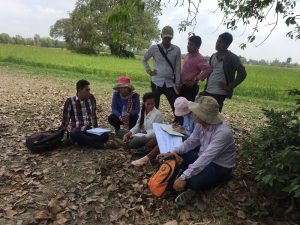
Mr. Chou Cheythyrith, EPIC project partner from GDA, (facing camera) explains the experiment on Trichoderma and pest-resistant rice varieties to visiting representatives from various NGOs, public institutes, and private companies. (Photos: EPIC project)
PREY VENG, Cambodia—An important strategy to reduce reliance on chemical pesticides in Cambodia is steadily moving through a project that encourages the use of environment-friendly biological control agents (BCA).
Over the last decade, Cambodian rice farmers have mainly relied on chemical pesticides as a major method for controlling pests and diseases. Experts warn that the rampant use of toxic chemicals is likely to lead to numerous long-term effects on the health of farmers and the environment. Integrated pest management (IPM) and BCA provide an alternative to chemical pesticides. BCAs include insects, fungi, and other natural products to manage pests.
The project, EPIC (Development of ecologically-based, participatory IPM package for rice in Cambodia), is helping pave the way for the greater use of BCAs by providing policymakers with science-based information on the effectiveness of BCAs and their benefits on the environment and human health.

Participants from government institutions discuss the effectiveness of BCAs during their site visit.
On 17 March, officers from Cambodia’s Department of Agricultural Legislation, various departments from the General Directorate of Agriculture, and private companies visited the EPIC trial site on Trichoderma (a common soil fungus), pest-resistant rice varieties, and weed management in Prey Veng. The participants were able to observe the practice of IPM using a bio-control agent on commonly used and pest-resistant rice varieties. They also discussed with the researchers the effectiveness and possible effects of Trichoderma on the environment and human health, the responses of the farmers who observed the experiments, and the possible steps for their respective organizations in promoting the technology.
Following the visit, a consultative meeting was held on 27 March with officials from various departments under the Ministry of Agriculture, Forestry and Fisheries, research institutes, and private-sector groups to discuss the registration form for BCAs. All these aim to facilitate the endorsement from the Ministry that will lead to the production of effective, safe and good-quality BCA products in Cambodia that can be made readily available to farmers.
EPIC is a 4-year project led by the International Rice Research Institute and funded by United States Agency for International Development under the Feed the Future Innovation Lab for Integrated Pest Management. The site visit was implemented in collaboration with Deutsche Gesellschaft für Internationale Zusammenarbeit GmbH (GIZ).







